podcast link
https://anchor.fm/boscom/
Hello, this is Jose Parappully, Salesian priest and clinical psychologist at Sumedha Centre for Psychospiritual Wellbeing at Jeolikote, Uttarakhand, with another edition of Psyche & Soul.
God taking on human flesh and blood in Jesus of Nazareth gives a whole new dimension to the understanding of the body -- human, but also all living and non-living bodies.
SOCIAL IMPLICATIONS OF THE INCARNATION
In the beginning, John tells us, God was Word, but now it’s’ flesh. God as Word was abstract, distant, unfeeling. God as flesh and blood is warm, concrete, earthly. In God embracing our humanity, our bodiliness, our own embodiment is divinized. We become Godlike.
Word becoming flesh has profound consequences for our lives. Incarnation, God taking on human flesh and blood, means that God and the human body are inseparably united. We cannot worship God in the temple, church or mosque, and desecrate, destroy, dishonor or deny our bodies.
When we forget that God is present in our embodiment, we can not only dishonor and ruin our own bodies with drug and alcohol, sexual promiscuity and immorality, and excessive pampering, but we can also destroy and desecrate the bodies of others – the collective Body of God.
When we let children starve, when the so called civilized world stands as mute spectators to sexual exploitation of children, rape and burning of women, when we tolerate crime syndicates driven by greed and profiteering ravaging the bodies (and souls) of our vulnerable young through encouragement of drug and alcohol abuse and pornography, when our vulnerable old and homeless are left forsaken on our city streets, it is the collective body of God that is being desecrated. The body that is tortured and mangled, starved and emaciated, wasting away in overcrowded and inhuman prisons, the body ravaged by a deadly and uncontrollable Corona virus and other contagious diseases, and treated inhumanely and disposed of dishonorably – all these are the body of God that is being dishonoured.

DIVINIZATION OF NATURE
God not only became a human being like us, God also became part of the earth, part of the cosmos. God becomes not only a human being, but also bread and wine, fruits of the earth and products of human labour. In the transformation of the bread and wine into the body and blood of Christ in the Eucharist, God has divinized every created reality. The earth is sacred. The planets are sacred. Plants are sacred. Water and soil are sacred. Incarnation calls for the deepest respect and reverence for all created reality.
THE UNIVERSE AS THE BODY OF GOD
The Incarnation makes everything in the Universe itself the body of God.
Feminist theologian Sally McFague in her book “The Body of God” presents the Universe as an embodiment of God: “God is not in the Universe,” she writes, “God is one with the Universe, as a person is one with their body” or like a “Mother who encloses reality in her womb, bodying it forth, generating all life from her being.” God is one with the universe, in the sense it embodies God’s essence, being an emanation from God. The universe is not identical with God, is separate from God, but God’s essence is in every bit of the universe (panentheism), just like the baby is not identical with the mother, is separate from her, but is endowed with her essence, her own flesh and blood.
Spirituality of embodiment invites us to see the unfolding of God’s presence and action in every phenomenon of the Universe. In the Gnostic Gospel of Thomas, Yeshuva (Jesus) says: “Split the wood, and I am there. Turn over the stone, and there you will find me.”(#77)
The 12th century German mystic Saint Hildegaard of Bingen, Benedictine Abbess and Doctor of the Church, hears God saying to her in a vision: “I am the breeze that nurtures all things green… I am the rain coming from the dew that causes the grasses to laugh with the joy of life.” Created realities here not only emanates from God, but God identifies with every created reality.
God’s presence makes every created reality an embodiment of God, so marvelously and uniquely manifest in God becoming a human being like us in Jesus of Nazareth – the event we are preparing to celebrate in a week’s time.
Introspection
What does this presentation of a spirituality of embodiment, the implications of the Incarnation, of God taking on our flesh and blood, the divinization of nature, the universe as the body of God, trigger in us? How does it challenge us?
Prayer
We could now take a relaxed body posture, take a few deep breaths, become consciously aware of the God who became human and dwelling with us and in us, and whose essence we are in our embodiment, then hold before us the images of the Christmas story, and spend a few minutes talking to God about all that is being triggered in us, and listening to God to hear what God has to tell us as we get ready to celebrate God’s incarnation at Christmas.
I wish you all a very Happy and gracefilled Christmas.
Thank you for listening.
Pictures: courtesy Google Images
Jose Parappully SDB, PhD
sumedhacentre@gmail.com



















































